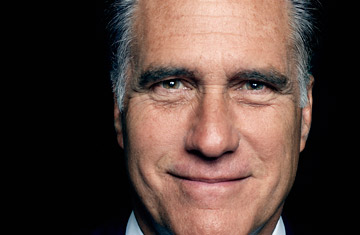
(9 of 11)
If Romney was typically allergic to outside financial risk, he could be a shrewd, even daring, inside operator. When Bill Bain first offered Romney the Bain Capital job, the younger man stunned him by turning it down. Romney was a superstar at the consulting firm and did not want to risk his income or his job. Bain later told the New York Times that he had to guarantee Romney's salary and promise that he could return to Bain & Co. if the new venture failed. By the time Romney accepted, "all the risk and investment was basically on my side," Bain said.
Bob White, an old friend and a campaign adviser who joined Romney at Bain Capital, says the change of job was a bold move nonetheless because half the seed money for the new venture belonged personally to the Bain & Co. partners. "If we went out and we lost their money--I don't care what guarantees or what assurances--we were not going to go back to Bain & Co.," White says. "In retrospect it looks like a no-brainer. But at that moment in time it was a big risk for both of us."
By 1991, Romney's investment business was thriving and the sister consulting firm was in desperate financial trouble--ironically because of its own attempt at a leveraged buyout. Bain and his seven co-founders had borrowed more than $200 million on behalf of the company and paid most of it to themselves, in effect cashing out their equity without giving up their controlling stake in the firm. But then business took a downturn, and the company could no longer meet its loan obligations.
Amid enormous tensions among the owners and partners, Bain & Co. turned to Romney, as the only honest broker who had everyone's trust, to right the firm. "There were in my opinion no other candidates," says Thomas Tierney, then the head of the company's San Francisco office.
At one early meeting, a Goldman Sachs partner named Mikael Salovaara told Romney that Bain & Co. did not have even a 5% chance of surviving. Romney began to probe, but Salovaara cut him off. "Why don't you shut up and let me finish talking?" Salovaara said.
"Mitt stood up, Salovaara stood up," says Rehnert, and "I thought I was going to see Mitt get in a fistfight." Friends pulled Romney out of the room. By the end of the day, Romney persuaded Bill Bain to fire Goldman Sachs and give him authority to broker a deal.
Romney summoned Bain & Co.'s 17 top nonequity partners, who brought in most of the business but had never been allowed to see the books. Romney showed them. "This is a crisis that's going to play itself out in days and weeks, not months and years," he said. For three days he kept the partners in a conference room, asking for unanimous consent that he become interim CEO. Then he went to Bain and asked the same.
Romney negotiated write-downs from Bain & Co.'s creditors, telling them they could have 50 on the dollar or stand in line in bankruptcy court. He persuaded the senior partners to take on the firm's remaining debt if the founders would hand over ownership. And then he sought a meeting with Bain, who arrived from a formal dinner in a tuxedo. Romney told Bain that he and the other owners would have to relinquish control of the firm and give back most of the money they had taken out of it.
